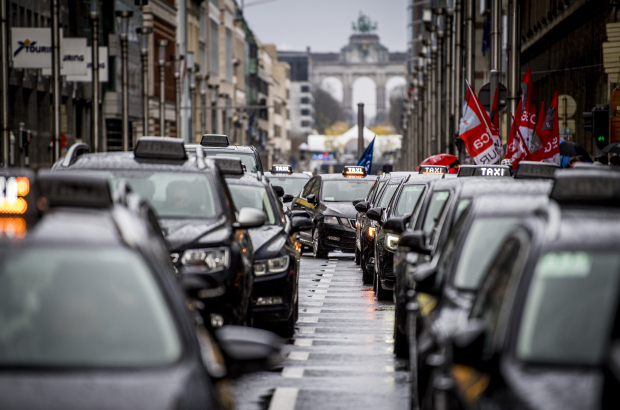- Daily & Weekly newsletters
- Buy & download The Bulletin
- Comment on our articles
Brussels parliament to discuss Uber ban today amid taxi protests
A decision from the Brussels Court of Appeal to uphold a ban on American ride-hailing company Uber that prohibits its drivers from operating in the capital has sparked protests across Brussels this week.
The Brussels parliament will meet in plenary session this Friday to consider four texts relating to the Uber/taxis case and discuss the situation.
Uber has long been at war with the taxi sector, ever since it first arrived under its Uber Pop banner in 2014. The company’s business model, in which drivers are not employees but rather independent contractors - a status that leaves them without social rights and legal protections - is seen by many as being at odds with progressive European labour standards.
When Uber Pop was banned not long after its arrival in Brussels, Uber focused on its Uber X service, using licensed professional private-hire car drivers. Last Friday, a Brussels court ruled that a 2015 ban targeted at Uber Pop was still valid, and applied to Uber X, as well.
“This is a real blow to the drivers,” Asmaa Snaïbi, spokesperson for many of the drivers, told De Standaard. “A downright catastrophe. For years the system has been tolerated, and they kept handing out licences. People have built their entire lives around this, and now they are taking everything away from us. The drivers, who are self-employed, will be without income.”
There are currently 1,261 traditional taxis in Brussels and about 1,196 drivers for Uber or French company Heetch that compete with them in what critics condemn as a “race to the bottom”.
One grievance of traditional taxi drivers is that they must adhere to much stricter working requirements, including difficult licencing tests and an annual physical, and pay for expensive taxi licences that can cost upwards of €60,000 today. Meanwhile, Uber drivers operate under the much laxer guidelines intended for limousine drivers.
Flanders reformed its taxi sector to make room for platforms like Uber and Heetch, but no such reform was made in Brussels despite promises from minister-president Rudi Vervoort (PS).
Vervoort belatedly unveiled a Taxi Plan at the end of September on the eve of planned protests from Uber drivers, who were angry at receiving fines for operating following a separate ban from the city made in March of this year.
That plan called for equal statuses for both Uber drivers and traditional taxi drivers, minimum rates for rides and the enforcement of set quotas.
Now he and his cabinet are looking into a separate, temporary solution for the drivers affected by the court ruling last week, but such efforts have already angered traditional taxi drivers. About 400 of them protested on Thursday morning, blocking roads and causing major traffic issues in Brussels.
“We apologise to the people who are stuck in traffic, but as citizens they should also take an interest in what is happening: the courts are deciding and the politicians want to overrule them,” Sam Bouchal, secretary general of the Brussels Taxi Federation (BTF), told Le Soir.
“This would be a dangerous precedent for the separation of powers. If MEPs validate an individualistic system like the Uber model, we are heading towards the end of social security financing, the cement of civilised societies. If the strongest no longer support the weakest, it will be the law of the jungle.”
Like many of Uber’s opponents, Bouchal points to the American business model as a sickness against which Brussels must protect itself.
“These multinationals, so popular with our young people, are exempting themselves from taxes and employer contributions by saying that each driver is his own boss. They are undermining our solidarity systems, which finance health, education, culture, etc,” Bouchal said.
Until the Brussels parliament approves a temporary solution that will allow drivers back on the road, possibly by 10 or 13 December, Uber has decided to set up a €1 million compensation fund for those who are unable to work.
All LVC licence-holders who provided at least 10 rides through the Uber app in October and November will be eligible for a €500 payout. "We hope this fund will help you and your family while parliament puts in place an emergency solution in the next few days," Uber said.
Photo: Jasper Jacobs/Belga














